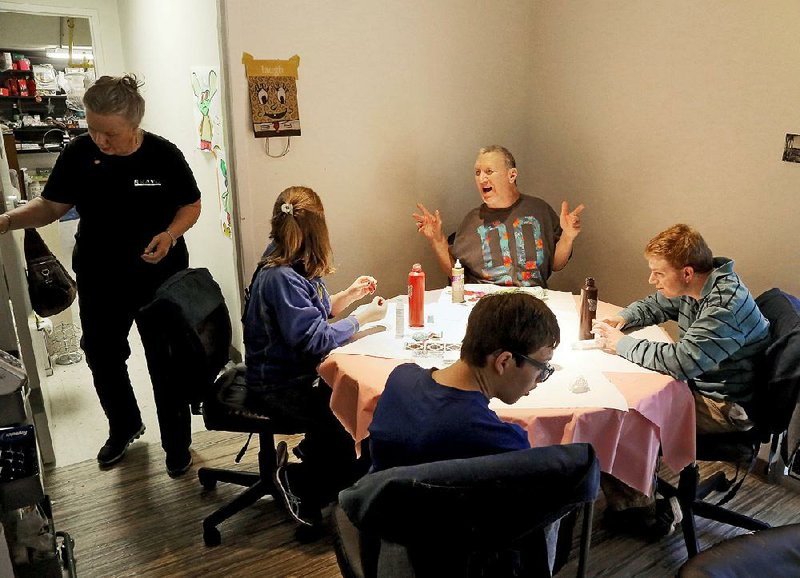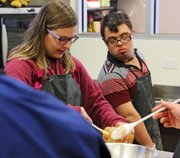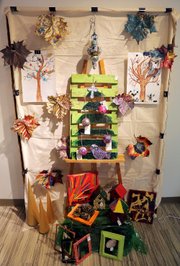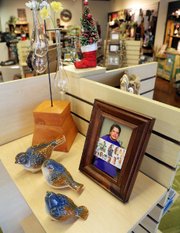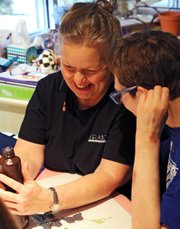There's a scent of peanut butter and a lot of flour in the air as a group of apron-wearing chefs busily measure out ingredients to make special dog biscuits.
RELATED ARTICLE
http://www.arkansas…">Program has employed the disabled for 30 years
"OK, time to get your hands in there and mix it up," says supervisor Jon Atwood.
Brushes, Bamboo and Biscuits
1525 Merrill Drive, Little Rock
Hours: noon-6 p.m. Tuesday-Saturday
Information: (501) 228-0063, icm-inc.org
"Ew! This feels so weird," says Carrie Wright, laughing as she gingerly puts one hand into a big mixing bowl.
After mixing, Wright and her companions will roll out the dough, then cut, bake and package the treats to sell next door at a little pet-theme boutique called Biscuits.
Down the hall and around a couple of corners, Sharla Eudy helps another group stick appliques on painted bottles for a display at Brushes, the small art shop/gallery where the shelves are full of decorated picture frames, bead jewelry, painted cottonwood leaves and collages. Each one is accompanied by an artist's name, photo and biographical information.
The cooks and artists may require a little more specialized instruction and it may take them longer to complete their tasks, but they are able to do it -- a point they're making to themselves and to the community.
Biscuits, Brushes and the adjacent home decor/gift store Bamboo are all part of a new program at Independent Case Management, 1525 Merrill Drive, Little Rock, a nonprofit organization that provides individualized services for people with developmental disabilities.
There's a generally accepted path people take in life: You go to school. You graduate. You either go to college or get a job. That path is easier and more obvious for some than for others. For those with Down syndrome, autism or other developmental disabilities, it's trickier and creates a dilemma for family members, as Sara Monday, program manager at ICM, can attest. Her brother, Edgar Zehtaban, is deaf, autistic and has pervasive developmental disability.
As she points out, these special-needs adults can be in public schools until age 21 or 22.
"That's kind of your safe zone," she says. "I know what they're going to do until they turn 22. What happens when they turn 22? Where do they go?"
ICM, which was founded in 1988, is one of several organizations across the state that provides services to developmentally disabled adults through the Arkansas Department of Human Services' waiver program. Currently, 3,751 adults statewide receive services that include supported living, therapy, transportation and respite care; 105 of them participate in supported employment programs that provide training and supervision to help them find and keep jobs.
Waiver-supported programs like ICM's Bridging Recreational and Vocational Opportunities (BRAVO) give families an option, a safe place to send the clients where they can be with friends and learn new skills. BRAVO is relatively new and has 17 participants ages 20-81, with more on the waiting list. There are plans to expand the program, open to people ages 18 and older with a high school diploma and who qualify for Medicaid, statewide.
While ICM's paid internship and supported employment program are new, the idea isn't. Other programs at groups such as Arkansas Enterprises for the Developmentally Disabled and Easter Seals have existed for years. BRAVO is in its early stages and they're still growing and expanding to the level of AEDD and Easter Seals, but ICM offers something the others don't -- its own retail stores with client-produced merchandise.
...
BRAVO came about, Monday says, because ICM saw a need in central Arkansas, a new way to "bridge that gap" after their clients left school.
"There's other sheltered workshops where they do piecework," Monday says. "The more we thought about it, a lot of the clients are capable of doing so much more."
So in 2015, ICM developed and opened its three for-profit retail stores: Biscuits and Brushes in April, Bamboo in September. BRAVO clients attend classes where they learn independent living skills like laundry, grocery shopping and cleaning up the kitchen. Then they spend time baking dog treats, doing art projects, unpacking boxes and learning how to greet customers.
Some come three days a week. Some come only mornings or afternoons. Regardless of how often they come, the participants are paid for the time they spend working in the stores, and artists receive 80 percent when they sell a piece of artwork at Brushes.
It's a program that's as individualized as possible and is designed to give clients a sense of responsibility and freedom.
Monday says, "When they come here, they get to choose what their schedule is for the day. Within reason."
They want their clients to learn, but also to enjoy their time there. With individualized care, the program can be specially tailored to fit everyone's needs. Monday sees the effects every day in her own family. While her brother didn't fit with other special needs programs in the area, he has been able to adapt very well to BRAVO.
"It's given my brother that opportunity," she says. "He doesn't have to sit at home with a caregiver anymore. He's able to work on his skills. It adds meaning to his life. He's a productive citizen, just like we are when we graduate, we start working, we pay our bills. He wakes up and he knows Tuesday, Wednesday, Thursday, he's got to go to work. He looks forward to it."
Fellow client Carrie Wright feels the same way, saying the other programs she'd tried in Little Rock and Benton "weren't just right" for her.
"I find this place atmospheric and friendly and amazing," she says with a smile.
What they learn at BRAVO doesn't just help them on the job. They take it home with them too, says marketing and communications coordinator Robin Green, recalling a client whose mother was surprised to find her son in the kitchen one night washing the dishes -- something he'd never done at home.
"That's what they do here. So he, at home, actually took the initiative."
Monday adds, "Keeping their room cleaner, packing their own lunch, those small steps, gaining independence, is cool."
When it comes to living their own lives and having jobs, often it's not just a matter of overcoming their own natural limitations, but the limits and restrictions placed on them by others. In most situations, Green says, those restrictions aren't warranted.
"Just because you have a disability doesn't mean that you can't have a job, that you can't work. People deserve every chance they can get, just like the rest of us, to have a job, to have a paycheck, to pay for your own things. Why limit them just because they may be a little limited in some ways?"
"Even though they may have different abilities, they're still able to complete a task or to have a job," Monday adds. "They have rights and they have a choice. They have the right to be able to do meaningful work."
People with disabilities just need a little extra help in getting there. Clients work one on one with advisers who help them set goals based on their skill level and what they're capable of. For some, it may take three months to achieve goals. It may take a dozen extra steps, but they can complete the task. For others, it may take a year. But once their goals are achieved, they set new ones.
"This is a way for us to help empower them," Monday says. "To say, 'You can do this. Let's figure out how you can do it.'"
In the retail stores, the store managers like Biscuits' Jon Atwood have been trained to help them learn and perform their given tasks.
While there are unique challenges, Atwood says, ultimately, working at Biscuits is much like other retail store jobs he has had: Leadership and learning how to communicate with coworkers are key. The biggest problem for him was learning to bake. Otherwise, "It's pretty much the same as it is anywhere else that I've been.
"We just cut up and laugh and joke just like every other job that I've been at. I've laughed more at this job than I've laughed at any job I've ever had."
...
The clients are learning a bit about commerce as well. Before Brushes opened, they were busy with a lot of art projects to build up the inventory and, Green says, they were interested and cared about what they were doing. But when Brushes opened and they started receiving extra money when their pieces sold, their enthusiasm took off.
"It was fun to see that click," Green says. "'If I put more time and effort into what I'm doing, it's going to sell and I'm going to get money from it.' They're very eager to do art now. They like getting that paycheck, just like all of us."
They don't just get the paycheck. They also get personal interaction with customers. Part of the goal for the stores is to improve the clients' social skills.
People who come into the stores may have the opportunity to see firsthand the work that the BRAVO clients are doing. There are windows in the wall of Brushes, so if the clients are in an art class, customers can see them at work. It's the same in Biscuits, where windows open up to the kitchen, where clients are hard at work mixing, rolling, cutting and baking.
When someone buys a piece of art at Brushes, they get a profile card giving them information about the artist who painted the Christmas ornament or decorated the picture frame. If the artist is actually on the premises, BRAVO employees try to make sure there's a face-to-face meeting.
As much as it's good for clients to meet the customers in Brushes, meeting the Biscuits customers is the highlight of the day.
"Oh my goodness, when a dog comes in it's like a free-for-all," Green says, laughing. "Everyone stops."
It's fun, but it's also a valuable learning tool, showing BRAVO clients the full range of the business from start to finish and making their work more meaningful.
Green says, "A customer comes into Biscuits with their dog, it's like, 'I'm baking the biscuits for this dog. I made this dog happy.'"
"To hear 'My dog loves the biscuits,' it gives them ownership," Monday adds.
As they increase the number of clients, ICM is working to create relationships with other businesses in the area so they can, eventually, place clients in new jobs out in the community.
There are also plans to expand the program into other communities. There are ICM offices in Fayetteville, Fort Smith, Prescott and Monticello and staff and case managers throughout the state; they hope to implement BRAVO and the paid intern programs there as well.
ICM recently bought Flywheels Famous Pies in Prescott. Clients will help prepare and deliver orders, giving them the opportunity to get out in the community and meet people. As for the rest, Green says, "We'll see what the need is in those communities."
It may be a coffee shop. Or another pet store.
Style on 01/10/2016
